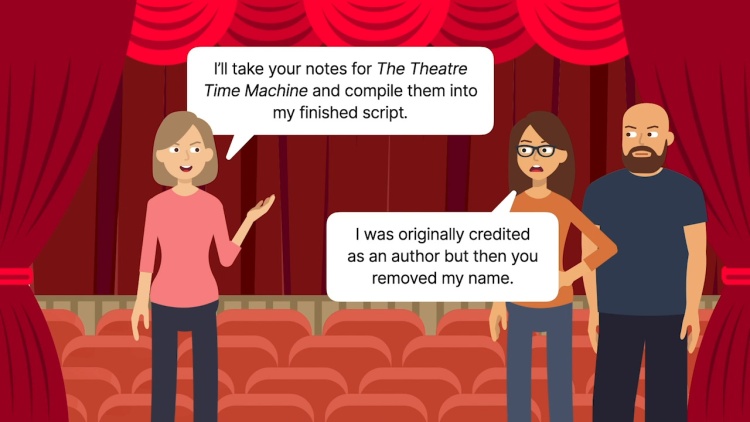Erickson v. Trinity Theatre, Inc.
United States Court of Appeals for the Seventh Circuit
13 F.3d 1061 (1994)
- Written by Mary Pfotenhauer, JD
Facts
Karen Erickson (plaintiff) helped establish Trinity Theatre, Inc. (Trinity) (defendant) and maintained several positions there for 10 years. During her time at Trinity, Erickson finished writing three plays, Prairie Voices: Tales from Illinois (Prairie Voices), Much Ado About Shakespeare (Much Ado), and The Theatre Time Machine (Time Machine). After developing much of Prairie Voices and Much Ado, Erickson conducted improvisational idea sessions with Trinity’s actors. Suggestions by some of the actors were adopted into the completed scripts, but Erickson retained final control over what material was chosen. For Time Machine, Erickson collaborated with Paddy Lynn, a Trinity actor. Lynn was initially identified as co-author of the script and received royalties from performances. Erickson later denied that Lynn was ever intended to be a joint author. While Erickson was still with Trinity, Erickson and Trinity agreed that Trinity would pay royalties to Erickson for performances of the plays. Two years later, Trinity stopped paying royalties to Erickson. After obtaining copyright registration for the three plays, Erickson asked Trinity to cease all performances. Trinity refused. Erickson responded by suing Trinity for copyright infringement. Trinity argued that it had a right to use the plays because its members were joint authors of the plays. A magistrate judge granted a preliminary injunction preventing Trinity from performing the plays. The district court affirmed. Trinity appealed to the Seventh Circuit.
Rule of Law
Issue
Holding and Reasoning (Ripple, J.)
What to do next…
Here's why 907,000 law students have relied on our case briefs:
- Written by law professors and practitioners, not other law students. 47,100 briefs, keyed to 996 casebooks. Top-notch customer support.
- The right amount of information, includes the facts, issues, rule of law, holding and reasoning, and any concurrences and dissents.
- Access in your classes, works on your mobile and tablet. Massive library of related video lessons and high quality multiple-choice questions.
- Easy to use, uniform format for every case brief. Written in plain English, not in legalese. Our briefs summarize and simplify; they don’t just repeat the court’s language.





